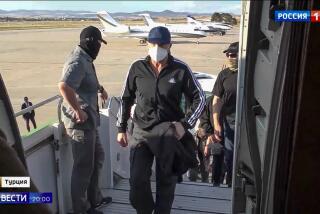EUROPE : Lost and Found in Berlin: Crime Takes a Toll
BERLIN — The discovery near Moscow this week of the Berlin police chief’s official car--stolen in the spring of 1994--has highlighted anew the problem of Eastern European crime gangs and their growing use since 1989 of Berlin as an operations hub.
Berlin police say the car’s good condition and low mileage make them believe that it was ferried to Russia aboard one of the many transport aircraft that hauled Soviet military equipment home at the end of the Red Army’s 49-year presence in eastern Germany.
Berliners hooted in May 1994 when the police chief’s car, a dark-blue Mercedes sedan valued at about $39,000, was stolen from a prominent Berlin shopping street in broad daylight. (The driver on duty, who was found to have been in a department store when the theft took place, claimed he had just run inside to use the restroom.)
German car theft statistics were climbing rapidly at the time, and the public took the incident as a sign that even their top law enforcement officials were defenseless against the wiles of the so-called Russian mafia.
On Monday, Russian authorities alerted Berlin Police Chief Hagen Saberschinsky that his Mercedes had been found in the city of Podolsk, south of Moscow, by officers on a routine check. It had been stripped of its locks, siren, two-way radio, cellular phone and radio-operated traffic-control system but was otherwise in good working order.
The Berlin Police Department called the car’s recovery a success. But to the public, the news was just another reminder of the way the turbulence and poverty in the former East Bloc have made their city less secure since the fall of the Berlin Wall.
Car theft, in particular, has shot up. The biggest increase took place in 1993, when 20,702 cars were reported stolen in Brandenburg, the state that surrounds Berlin. That was nearly double the number for 1992.
Police statisticians say at least half of these cars wound up in Eastern Europe--an easy hop, considering Brandenburg’s 150-mile border with Poland.
Car theft continued to increase in 1994, the year the Russian army completed its withdrawal from eastern Germany. As the troops packed up and prepared to go home, reports became widespread that some were loading stolen cars and other contraband aboard the military planes that were supposed to take their heavy gear back to Russia.
Official attempts to check out these reports were generally unsuccessful, because Russian officers wouldn’t let the German police near the departing planes. In a few cases, however, the German authorities did get close enough to find some tantalizing evidence: At one airfield north of Berlin, for instance, they were shooed away from the airplanes but managed to venture into the hangars, where they found seven stolen cars, valued at a total of $330,000.
Russian commanders called the find an isolated case.
Scandalized Berliners wondered at the time whether such goings-on would cease once the Russians were gone, but law enforcement authorities warned that they wouldn’t because Eastern European demand for German luxury cars was growing.
Indeed, the mayor of one small village near the former Soviet airfield of Sperenberg has even claimed that somebody still uses the abandoned facilities--in the middle of the night. Mayor Detlev Arndt said that during the winter months, as often as once a week, he heard the distinctive roar of Antonov transport planes taking off and landing at the huge airfield, which lies just south of Berlin.
Arndt suggested that international crime gangs were flying in low, to evade German radar, and landing by the light of car headlights. He asked the customs service to come and have a look, but all the inspectors could find were some tire tracks near the runway.
Car theft here began to taper off in 1995, thanks to a new rule requiring electronic anti-theft devices on all new cars sold.
But police say that the Eastern European gangs are becoming more brutal and better organized and have moved into other areas: truck hijackings, protection-money schemes, prostitution rings, the selling of smuggled tax-free cigarettes, money laundering and counterfeiting.
(BEGIN TEXT OF INFOBOX / INFOGRAPHIC)
The Russian Connection
The Berlin police chief’s Mercedes sedan, valued at about $39,000, was stolen from a prominent thoroughfare in broad daylight two years ago. It turned up in Podolsk, south of Moscow. Berlin police say the car’s good condition and low mileage make them believe that it was taken to Russia aboard one of the many aircraft that hauled Soviet military equipment home when the Red Army left eastern Germany.
More to Read
Sign up for Essential California
The most important California stories and recommendations in your inbox every morning.
You may occasionally receive promotional content from the Los Angeles Times.










